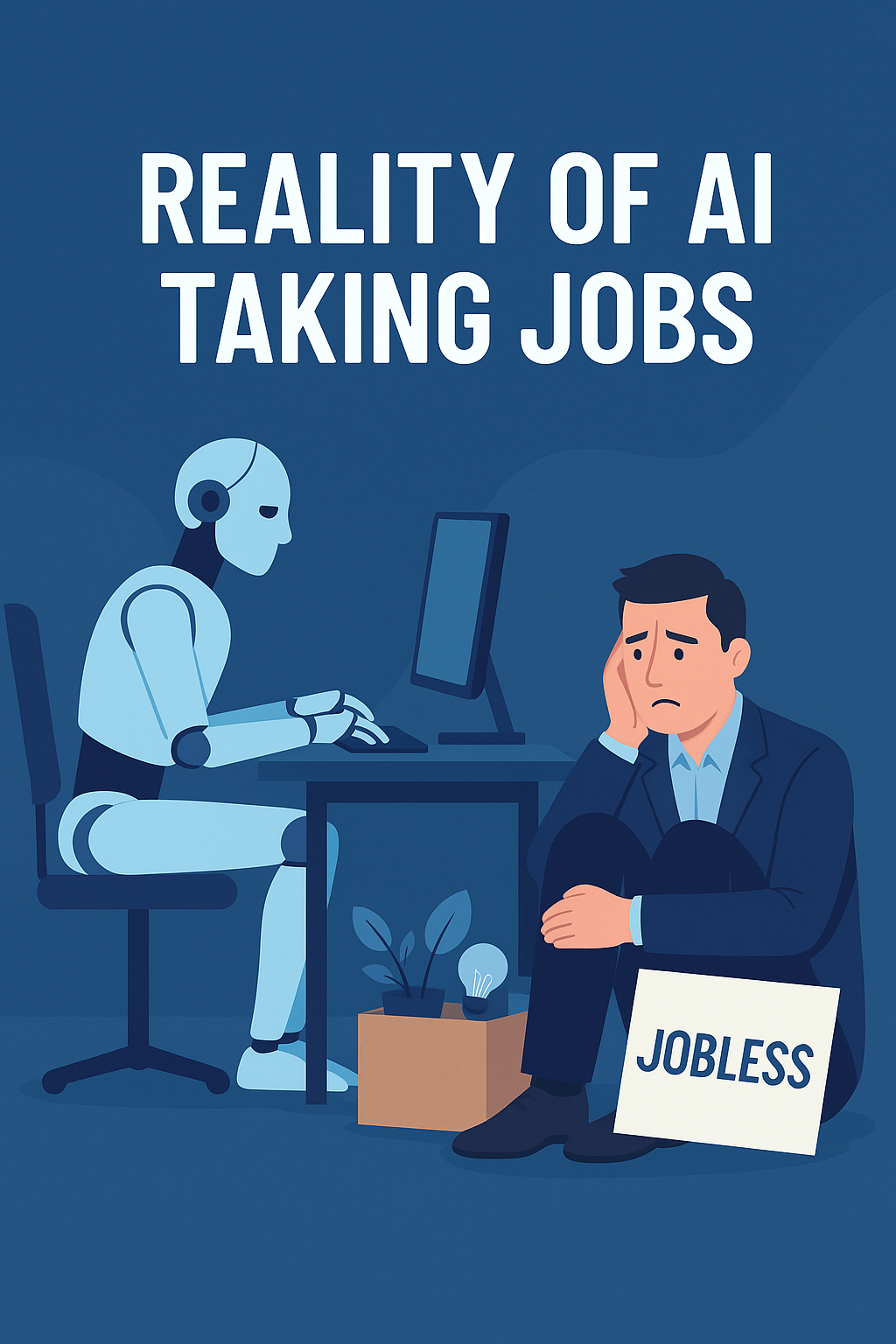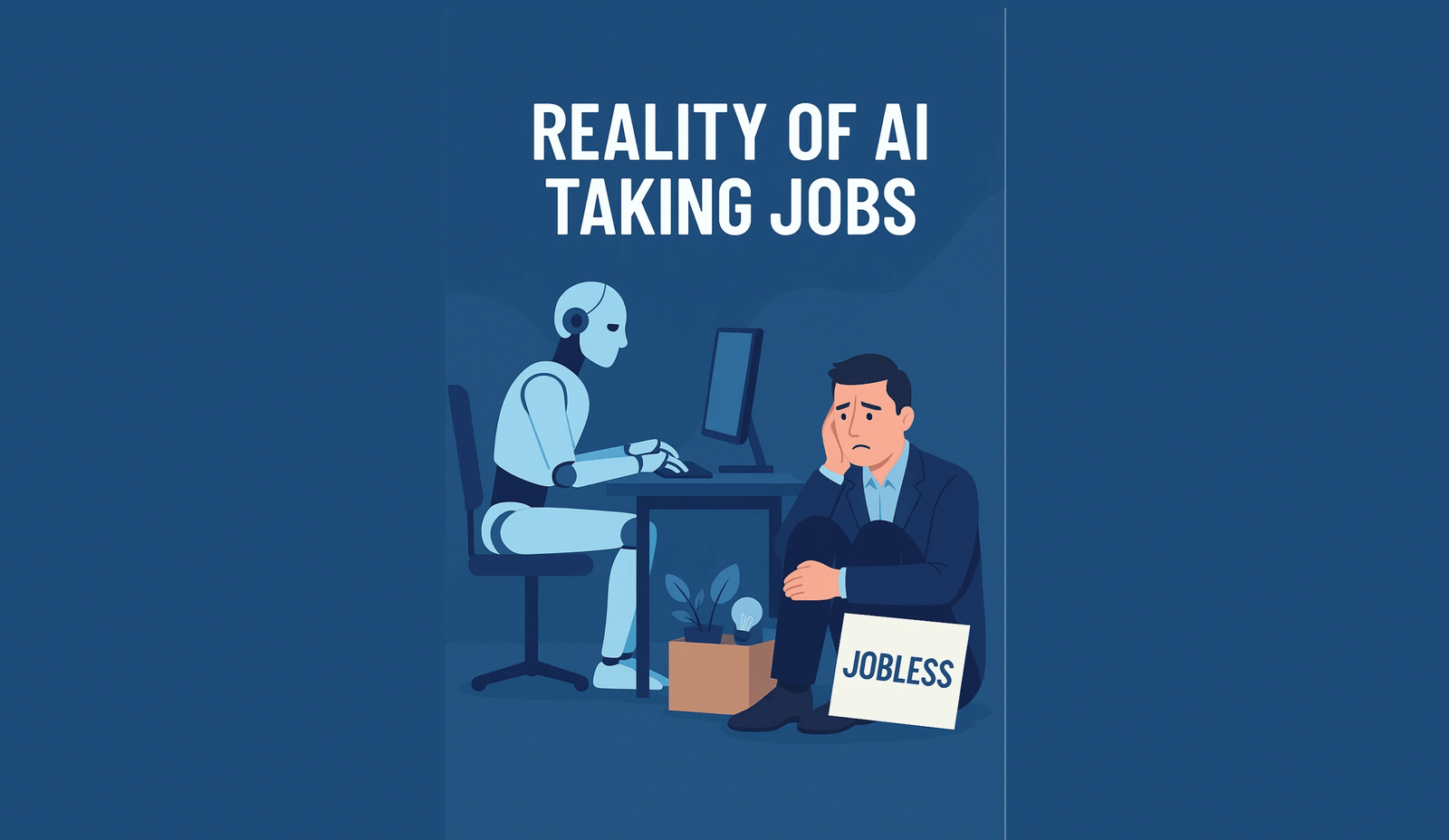Hey! I’m Adesh Saxena. Over the last 14+ years, I’ve worked in digital marketing and IT, mostly with businesses dealing with cybersecurity, data, and tech-driven growth. In all these years, I’ve seen a lot of change, but nothing quite like what AI is bringing today.

If you’ve been hearing people say, “AI won’t take our jobs,” well… I want to talk honestly with you here. AI is already changing jobs in many companies, big and small, whether they admit it openly or not. And instead of fearing it, I want to help you understand what’s really happening and what you can do about it.
So, grab a coffee ☕ and let’s get into it. I promise to keep it simple and useful.
What’s Happening with AI and Jobs? The Truth Behind the Headlines
You may have seen headlines saying, “AI replacing jobs,” or maybe you saw this image I shared where tech companies openly admitted they’re replacing some staff with AI systems.
Here’s the deal: AI isn’t taking every job, but it is automating many tasks that humans used to do. And these tasks are often repetitive, routine, or data-heavy. Think about jobs where someone has to do the same thing over and over—AI and automation tools are perfect for those.
Examples of jobs and tasks AI is replacing or changing:
-
Customer service reps answering basic questions
-
Data entry clerks who manually input information
-
People creating simple reports or content summaries
-
Routine IT maintenance tasks
-
Some administrative jobs like scheduling and organizing
So what happens? Companies can get the same work done faster and cheaper with AI tools, which means fewer people are needed for those specific tasks.
But Why Is This Happening Now?
Technology has always changed jobs. Remember when computers first became common? Many manual jobs shifted to more tech-based roles. AI is just the latest step—but it’s moving much faster than before.
Here’s why companies are embracing AI now:
-
Cost savings: AI can work 24/7 without breaks, and it doesn’t need salaries or benefits.
-
Speed and efficiency: AI can analyze tons of data in seconds and automate tasks quickly.
-
Consistency: AI performs tasks the same way every time, with fewer errors.
-
Competitive edge: Companies want to stay ahead and innovate, so they invest in AI.
Does This Mean People Are Out of Work Forever?
Not necessarily. Yes, some jobs will be reduced or changed, but new opportunities will also come up. The key is to be ready to change with the times.
I want to share a story from my experience to show you this more clearly.
📝 A Personal Story: How AI Changed a Small Company I Worked With
A couple of years ago, I worked with a small IT company in Mumbai. They had a team of about 20 people, mostly handling customer support and IT maintenance. When they started using AI-based chatbots and remote monitoring tools, a few things happened:
-
The chatbot began answering many common customer questions instantly, instead of waiting for a human agent.
-
The remote monitoring tool automatically detected and fixed simple IT issues without a technician visiting the site.
-
This saved a lot of time and reduced human errors.
At first, some employees were worried they’d lose their jobs. But the company didn’t let that happen. Instead, they trained their team to handle more complex problems, manage AI tools, and focus on building better customer relationships.
The employees became more skilled and valuable. They didn’t get replaced; they evolved.
So, What About Big Companies?
Big tech companies like Google, Microsoft, and Amazon have publicly said they’re automating parts of their workforce with AI. This might include things like:
-
Automating data processing and analysis
-
Using AI to write simple content or reports
-
Deploying AI for customer chat support
-
Automating testing and software updates
When big companies do this, the impact is large because of the scale. But this is happening in smaller businesses too—just on a smaller scale.
🤔 Let Me Ask You — Have You Seen AI Tools or Automation Being Used Where You Work?
Is your company using AI to automate certain tasks? Maybe it’s something simple like scheduling meetings automatically or analyzing sales data?
If you’re not sure, it’s a good time to start noticing. AI is more common than you think!
How Can You Stay Safe and Grow in This AI Era? 🌱
Now, here’s the good news: AI is a tool, and you can use it to your advantage. You don’t need to fear losing your job if you learn to work with AI instead of against it.
Here’s what you can do right now:
1. Get Comfortable With AI Tools — Start Small
You don’t have to be a tech genius. Many AI tools today are designed to be user-friendly.
-
Try free AI tools like Grammarly for writing, or Canva’s AI design features for creativity.
-
Explore chatbots or automation tools your company might already have.
-
Watch simple tutorials on YouTube about AI basics.
The more you understand, the less scary AI becomes.
2. Strengthen Your Human Skills — Things AI Can’t Replace
AI is great with routine tasks but can’t replace:
-
Creativity
-
Empathy and communication
-
Problem-solving
-
Leadership and strategic thinking
Focus on these skills in your daily work. They make you indispensable.
3. Keep Learning and Upskilling
The world is changing fast, so keep learning.
-
Take online courses on platforms like Coursera, Udemy, or LinkedIn Learning about AI basics or your industry’s new trends.
-
Attend workshops or webinars.
-
Network with others who are learning AI tools.
4. Be Open to New Roles and Opportunities
AI creates new jobs too! Some examples:
-
AI trainer (teaching AI how to work better)
-
Data analyst
-
Digital transformation consultant
-
AI ethics officer
Stay curious and open-minded about where your career could go.
Did You Know? 🤓
By 2025, it’s estimated that up to 50% of current jobs will have some tasks automated, but many new jobs requiring human-AI collaboration will emerge too.
Famous Quote to Keep in Mind 💬
“The future belongs to those who learn more skills and combine them in creative ways.” — Robert Greene
It’s not about beating AI; it’s about working alongside it with new skills.
A Closer Look: How AI is Impacting Different Industries
Let’s quickly see how AI is changing work in some popular fields:
| Industry | AI Impact Examples | What You Can Do |
|---|---|---|
| Customer Service | Chatbots handling FAQs, automated call routing | Learn to manage AI tools, focus on empathy and complex issue handling |
| Marketing | AI tools generating content ideas, optimizing ads | Develop creativity and strategy skills, learn AI marketing platforms |
| IT & Cybersecurity | Automated threat detection, system monitoring | Upskill in AI cybersecurity, incident analysis |
| Finance | AI in fraud detection, automatic reporting | Gain knowledge of AI financial tools, data analysis |
| Education | Personalized learning platforms, automated grading | Focus on student engagement, curriculum design |
What About Those Afraid of Losing Their Jobs? Let’s Talk Heart to Heart 💖
I get it. It’s scary. You work hard every day, and then technology feels like a threat. But remember, this is a chance to grow and change.
Ask yourself:
-
What tasks in my daily work are repetitive and could be automated?
-
How can I spend more time on meaningful, creative tasks?
-
What skills can I learn that AI can’t easily replace?
When you focus on your strengths and adapt, you’ll be more secure and even more valuable to your company.
🤗 Your Turn: What Are You Most Excited or Worried About When It Comes to AI at Work?
Feel free to share your thoughts below. Are you ready to learn new AI skills, or does it feel overwhelming? Let’s talk about it!
Wrapping Up: The Future of Work is Human + AI Working Together
In my 14+ years of experience across industries like IT, digital marketing, education, and cybersecurity, one thing is clear: technology will keep evolving, and so must we.
AI is not here to just replace people; it’s here to transform how we work. Those who embrace this change with a learning mindset will thrive. Others who resist may find themselves struggling.
Remember, your human skills—your creativity, empathy, and problem-solving—are what machines cannot copy.
✅ Quick Action Plan for You Today
-
Start exploring AI tools related to your job.
-
Pick one human skill to strengthen this month.
-
Take a free online course on AI basics or your industry’s new tech.
-
Talk to your manager or colleagues about how AI is being used at your workplace.
-
Stay curious and open-minded about career changes.
Thanks for spending time with me on this topic! I hope you found it helpful and easy to understand. AI is here, and it’s not going anywhere. But your future depends on how you respond and grow with this change.
If you want, leave your questions or share your own story in the comments. Let’s learn and grow together. 😊 Would you like me to help you find some good free AI tools or online courses to get started? Just ask!
❓Frequently Asked Questions (FAQs)
Q1: Is AI going to replace my job completely?
No, but AI may automate certain tasks in your role. You can adapt by learning to work with AI and focusing on skills that require a human touch.
Q2: How can I start learning about AI without a technical background?
Begin with simple, user-friendly AI tools and free online courses that explain AI concepts in plain language.
Q3: Are creative and management jobs safe from AI?
Generally, yes. AI helps with routine tasks, but human creativity, leadership, and decision-making are still essential.
Q4: How do I convince my company to invest in AI training for employees?
Show the benefits of AI for productivity and suggest small pilot programs or workshops. Leadership often responds well to clear business value.
Q5: What if I don’t have time to learn AI skills?
Try dedicating just 15-30 minutes a day to learning or exploring AI tools. Small steps add up.

Grow your brand with Devetol Advertising! We specialize in digital marketing solutions. Visit Devetol.com for a free consultation. SEO , Social Media, PPC, Content Writing PR, Digital Advertising, Web Marketing Leads, PR

